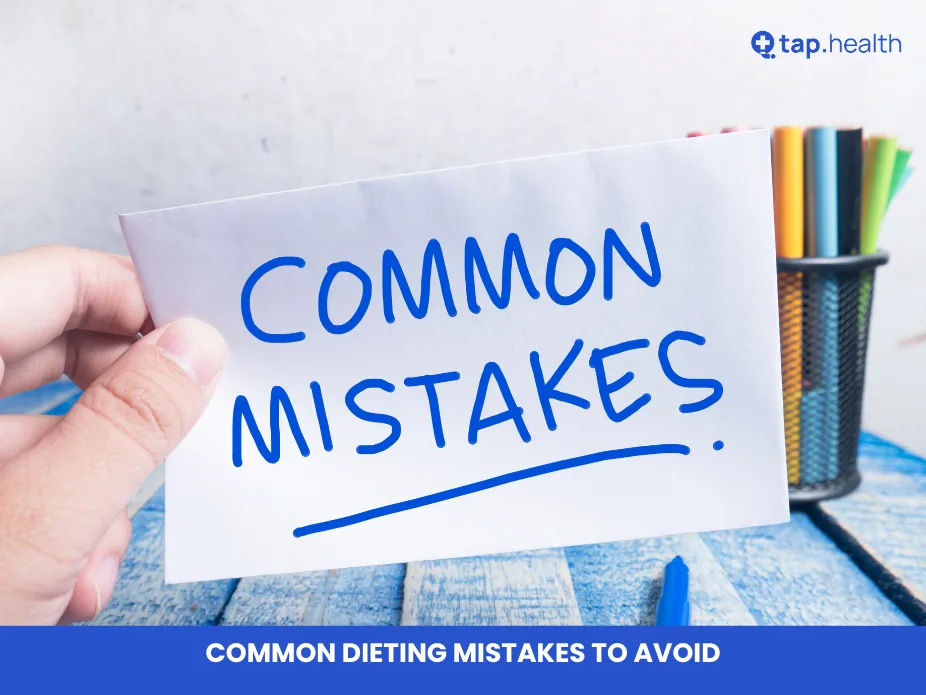Dieting for weight loss, better health, or fitness goals often leads to frustration due to simple errors. Understanding these common dieting mistakes helps create a sustainable plan. This guide explores why people make mistakes in dieting, offers solutions, and includes insights on avoiding calorie cutting errors, eliminating food groups pitfalls, and more.
Drastically Cutting Calories: A Major Weight Loss Mistake
One top mistake in dieting is slashing calories too low for quick results. This causes nutritional deficiencies, slowed metabolism, and muscle loss.
Why It Happens: People chase fast weight loss by extreme restriction, ignoring body needs.
Solution: Create a 10-20% calorie deficit. Calculate maintenance calories and reduce moderately. This supports gradual fat loss while maintaining energy and muscle.
Eliminating Entire Food Groups: Unsustainable Diet Error
Removing carbs or fats entirely is a frequent dieting pitfall. It leads to cravings, imbalances, and yo-yo weight.
Why It Happens: Trendy low-carb or low-fat plans promise rapid results but lack balance.
Solution: Choose nutrient-dense options. Include whole grains, healthy fats like avocados, and lean proteins. Consult a dietitian for personalized balanced eating.
Skipping Meals: Common Calorie Intake Blunder
Thinking meal skips accelerate progress, many overeat later from hunger crashes.
Why It Happens: It seems like easy calorie reduction, but triggers binge eating.
Solution: Eat 4-6 smaller meals daily. Add snacks like fruits or yogurt to stabilize blood sugar and curb overeating.
Relying on Processed “Healthy” Foods: Hidden Diet Sabotage
Diet-labeled packaged items often hide sugars, sodium, and additives.
Why It Happens: Marketing lures with “low-fat” claims, overlooking ingredients.
Solution: Prioritize whole foods: veggies, lean meats, nuts. Check labels for no excess additives.
Obsessing Over Scale: Ignoring Body Composition Changes
Scale focus misses muscle gain or water shifts.
Why It Happens: It’s quick feedback, but fluctuates daily.
Solution: Track measurements, clothes fit, photos, energy. Combine for holistic progress.
Neglecting Exercise: Diet-Only Weight Loss Myth
Relying solely on food ignores activity’s role in metabolism.
Why It Happens: Belief diet suffices, underestimating movement benefits.
Solution: Do 150 minutes cardio weekly plus strength training twice. Builds muscle, aids fat burn.
Underestimating Portions: Even Healthy Foods Add Up
Overeating nuts or oils derails despite nutrition.
Why It Happens: “Healthy” label encourages unlimited intake.
Solution: Use palm-sized protein, thumb-sized fats. Measure initially for accuracy.
Ignoring Hunger Cues: Mindless Eating Trap
Rigid rules override body signals, causing over or undereating.
Why It Happens: Calorie focus drowns natural fullness.
Solution: Eat mindfully when hungry, stop at satisfied. Builds intuitive eating.
Real-Life Dieting Mistake Examples
Jane cut to 1,000 calories daily for wedding weight loss. Fatigue hit, plateau followed from slowed metabolism. She switched to balanced deficit, added portions control—sustained results.
Mark skipped breakfast/lunch, binged dinners. Trainer advised frequent meals; he lost steadily with snacks.
Nutritionist Insights on Avoiding Diet Pitfalls
Dr. John Berardi, Precision Nutrition founder, stresses sustainable changes. Avoid fads; prioritize variety, exercise, body listening.
Research-Backed Tips:
- Moderate deficit for lasting loss.
- Portion awareness prevents excess.
- Cardio-strength combo preserves muscle.
- Balanced plates with protein, fats, fiber.
- Mindful habits stop emotional eating.
FAQ: Dieting Mistakes and Solutions
Can I enjoy favorites without derailing?
Yes, moderate portions fit goals. Balance is key.
Breaking plateau?
Vary routine: intensify workouts, tweak calories.
Intermittent fasting work?
Effective for some; ensure nutrients, avoid binges.
Manage cravings?
Hydrate, protein-fiber meals, small treats or swaps.
Protein needs?
0.8-1g per pound body weight, activity-adjusted.
How Can TapHealth Help Manage Diabetes Through Better Dieting?
TapHealth offers tools to track meals, avoid mistakes like portion errors or group elimination. Monitor glucose, get personalized plans for diabetes-friendly sustainable weight loss. Integrate habits to prevent spikes, promote health without frustration.is helps maintain muscle mass and keeps you feeling full.
References
- National Institutes of Health (NIH) – Healthy eating tips and advice on avoiding common dieting mistakes.



